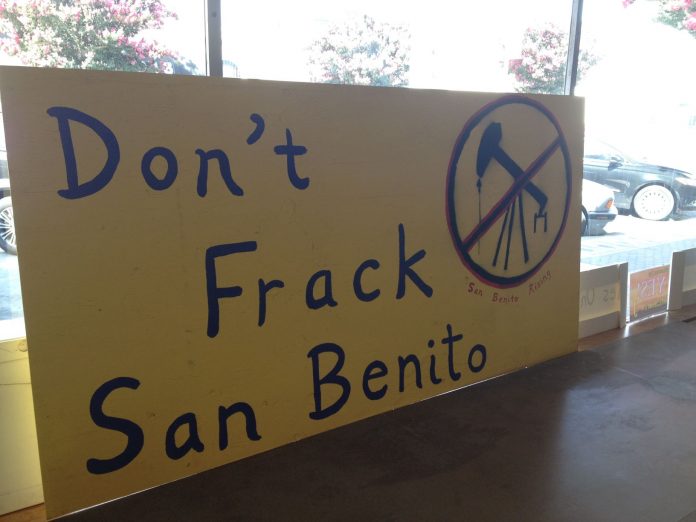Although Measure J is about fracking and other enhanced recovery methods at its core, much of the local debate to this point has focused on conventional oil drilling and what the initiative might or might not do beyond banning those specified practices.
Note: This is part two in a four-part series.
Although Measure J is about fracking and other enhanced recovery methods at its core, much of the local debate to this point has focused on conventional oil drilling and what the initiative might or might not do beyond banning those specified practices.
Recent advertisements from the No on Measure J side have stated that the initiative would ban all petroleum activities in the county, while one of opponents’ main campaign themes is a concern about the proposal reaching too far in its restrictions.
“They keep repeating that we’re banning all oil production,” said Larry Rebecchi, a Measure J supporter. “I don’t know why. It’s a big lie. They persist on that when they know it’s a lie.”
The measure on the county’s November ballot would ban fracking, cyclic steaming and acidizing as forms of oil extraction effective Jan. 1. Additionally, it would ban all petroleum activities in rural residential zones, which are pockets surrounding Hollister and San Juan Bautista. Existing projects affected by the initiative would get one to three years to comply.
Kristina Chavez Wyatt, executive director of the local business council and a consultant representing the organized opposition, responded by saying the measure would “shut down” petroleum production here because enhanced methods are necessary due to the county’s geology.
“Our oil is heavy and it’s shallow,” Chavez Wyatt explained. “You have to stimulate the well to get it flowing.”
Those enhanced practices – the measure’s opponents contend they are common in California – are used by the oil industry in order to capture hard-to-reach deposits in the Monterey Shale, in pockets otherwise unreachable through conventional drilling.
Each side addressed concerns over enhanced recovery practices in their respective arguments included in the full ballot initiative.
The measure opposition wrote that the proposal is “misleading and would bring extreme change.”
“It’s presented as a ban on a controversial drilling practice – but it’s one neither used nor proposed here,” according to the initiative argument against Measure J.
One of the main points stressed by Measure J supporters in their ballot argument is that the initiative is necessary to protect water sources.
“Toxic chemicals used in fracking can cause cancer, birth defects and infertility,” according to the pro-measure side as stated in the full initiative. “Matrix acidizing chemicals can have acute and chronic health effects.”
The proposed bans against fracking and the other enhanced recovery practices make up the first part of the initiative. The second major portion of the ballot question would bar all petroleum activities in those rural residential zones – which comprise less than 10 percent of the county, according to the planning director as previously stated to the Free Lance.
Here’s what voters will be asked on the ballot:
“Shall San Benito County’s General Plan be amended to ban High-Intensity Petroleum Operations (such as hydraulic fracturing, also known as fracking, acid well stimulation and cyclic steam injection, but not Low-Intensity Petroleum Operations) throughout all unincorporated areas, and all Petroleum Operations in residential general plan designations of Rural, Rural Transitional, Rural Residential, Rural/Urban, and Sphere of Influence Rural/Urban, with related zoning changes to implement the new General Plan policies?”
“It asks whether people want to ban fracking and related drilling techniques,” said Andy Hsia-Coron, one of the lead proponents in the Protect San Benito group supporting Measure J. “That’s really the major change.”
One local farmer, and president of the county farm bureau, has said he has a “problem when people misrepresent” what the initiative says.
“Everybody says it’s about no fracking,” said Richard Bianchi. “If you read the initiative, no fracking is part of it. It’s more widespread and much further reaching than fracking. That doesn’t get discussed.”
One of the central arguments from the opposition group, including Bianchi, is that the proposal would infringe on property rights.
“The thing on property rights, it works both ways,” Rebecchi said. “It’s inevitable that’s going to get in our aquifers.”
San Benito Rising, which later became the larger Protect San Benito group, hired San Francisco law firm Shute, Mihaly & Weinberger to help draft the initiative language. The firm has more than two decades of experience in drafting similar types of initiatives for local ballots and recently worked on the similar Santa Barbara County proposal to ban enhanced recovery practices there.
“We think these types of measures are really important tools for local jurisdictions to have,” said Catherine Engberg, a partner with Shute, Mihaly & Weinberger who helped to draft the document.
To read Measure J, go here.










